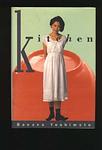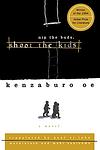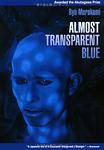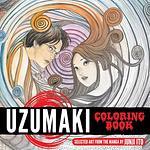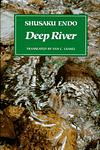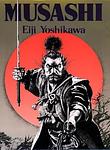The Greatest Japanese Books of All Time
Click to learn how this list is calculated.
This list represents a comprehensive and trusted collection of the greatest books. Developed through a specialized algorithm, it brings together 290 'best of' book lists to form a definitive guide to the world's most acclaimed books. For those interested in how these books are chosen, additional details can be found on the rankings page.
Genres
Countries
Date Range
Reading Statistics
Click the button below to see how many of these books you've read!
Download
If you're interested in downloading this list as a CSV file for use in a spreadsheet application, you can easily do so by clicking the button below. Please note that to ensure a manageable file size and faster download, the CSV will include details for only the first 500 books.
Download-
26. Black Rain by Masuji Ibuse
The novel is a poignant and detailed account of the aftermath of the atomic bombing of Hiroshima, as experienced by a Japanese family. Through the diary entries of a survivor and the narrative of the days that follow, the book explores the devastating impact of the bomb on the city's inhabitants, their struggle with radiation sickness, and the societal stigma they face. It delves into the physical and psychological trauma inflicted by the event, painting a somber picture of the human cost of war and the long-lasting effects of nuclear weapons on both individuals and communities.
-
27. Hard-Boiled Wonderland and the End of the World by Haruki Murakami
In this novel, two parallel narratives intertwine, one following a data encryptor in a dystopian, futuristic Tokyo who becomes embroiled in the machinations of a mysterious scientist and his granddaughter, the other set in a surreal, dreamlike town where a man is tasked with reading old dreams from unicorn skulls. As the story progresses, it becomes evident that the two worlds are connected in a profound and unsettling way, leading to a shocking conclusion that explores themes of consciousness, identity, and the nature of reality.
-
28. Poems of Matsuo Bashō by Matsuo Bashō
This collection of poetry explores the work of one of Japan's most renowned haiku masters. The poems, celebrated for their simplicity, depth and beauty, often draw from nature and the changing seasons to reflect on the fleeting nature of life. The author's work is known for its poignant observations, emotional intensity, and ability to evoke a sense of tranquility and enlightenment. This compilation is an essential read for anyone interested in traditional Japanese literature and the art of haiku.
-
29. The Honjin Murders by Seishi Yokomizo
"The Honjin Murders" is a captivating mystery novel set in a rural village in Japan. When a young couple is found brutally murdered on their wedding night in an isolated mansion, the local police are baffled by the lack of evidence and suspects. As the investigation unfolds, dark family secrets, hidden motives, and a series of puzzling clues emerge, leading the reader on a thrilling journey to uncover the truth behind the Honjin murders.
-
30. Kitchen by Banana Yoshimoto
The book is a poignant tale of love, life, and loss intertwined with the themes of food and kitchens. The narrative follows a young woman who, after the death of her grandmother, finds solace in the home of her friend and his transgender mother. As she navigates her grief, she also grapples with her growing feelings for her friend. The story explores the complexities of relationships, the concept of home, and the healing power of cooking.
-
31. Akira by Katsuhiro Otomo
Set in a post-apocalyptic Neo-Tokyo, this graphic novel follows the lives of two teenage friends, Tetsuo and Kaneda, who are members of a biker gang. After a motorcycle accident, Tetsuo develops telekinetic abilities and is taken by the military, which fears his growing powers might unleash another cataclysmic event similar to the one that destroyed Tokyo years earlier. As Tetsuo's powers spiral out of control, Kaneda, along with a group of rebels and psychics, must try to stop him and uncover the secrets of a mysterious entity known as "Akira," which is at the heart of the government's experiments and the city's destruction. The narrative explores themes of power, corruption, and the quest for identity against a backdrop of cyberpunk visuals and intense action.
-
32. Nip the Buds, Shoot the Kids by Kenzaburō Ōe
This novel tells the story of a group of reformatory school boys evacuated to a remote mountain village in wartime. The boys are treated harshly by the villagers, who view them as little more than animals. When a plague breaks out, the villagers flee, leaving the boys behind to fend for themselves. The boys attempt to create their own society, but when the villagers return, they are once again treated as outcasts. The book is a powerful exploration of the themes of isolation, rejection, and the struggle for survival.
-
33. The Sound of Waves by Yukio Mishima
The novel is a classic tale of first love between a young fisherman and a pearl diver in a remote Japanese coastal village. The story is set in the post-war era and it explores themes of love, tradition, and the power of nature. The fisherman's love for the pearl diver is tested by the village's gossip and the jealousy of a wealthy rival. Despite the challenges, their love remains pure and steadfast, mirroring the timeless and unchanging rhythm of the sea and the cycles of nature.
-
34. A Personal Matter by Kenzaburō Ōe
A Personal Matter is a novel that tells the story of Bird, a young man struggling to come to terms with the birth of his son who has a severe brain hernia. As he grapples with his personal demons and the societal stigma associated with having a disabled child, he also contemplates killing his son to end his suffering. The narrative explores themes of responsibility, shame, and the human condition, ultimately leading to Bird's acceptance of his son and his own life.
-
35. 1Q84 by Haruki Murakami
The novel is a complex and surreal narrative that intertwines the lives of two protagonists: a woman assassin who becomes embroiled in a mysterious and dangerous cult, and a male writer caught in a complicated love triangle. As they navigate their respective challenges, they unknowingly cross into an alternate reality, referred to as 1Q84, where the lines between fact and fiction blur. The novel explores themes of love, fate, and the power of the individual against the constraints of a conformist society.
-
36. Almost Transparent Blue by Ryū Murakami
The novel is a vivid and disturbing exploration of the lives of a group of young people living in a Japanese port town in the 1970s. They are involved in a hedonistic lifestyle, filled with sex, drugs, and rock and roll, as they aimlessly drift through life. The protagonist, a former student, serves as the narrator, describing the group's experiences in graphic detail, revealing a bleak picture of a generation lost in the aftermath of the post-war economic boom. The narrative's raw and unflinching portrayal of the underbelly of Japanese youth culture is underscored by themes of alienation, self-destruction, and the search for meaning in a chaotic world.
-
37. Uzumaki by Junji Ito
The book is a horror manga that centers around a small fog-bound Japanese town cursed by supernatural events involving spirals. As the obsession with the spiral pattern begins to spread among the townspeople, it manifests in increasingly bizarre and terrifying ways, warping both the minds of the inhabitants and the very fabric of the town itself. The narrative follows a high school teenager and her boyfriend as they struggle to understand and survive the madness engulfing their once-peaceful home, revealing the spiral's hypnotic and monstrous influence on both the human psyche and the natural world.
-
38. The Confessions Of Lady Nijo by Lady Nijo
This book is a candid autobiographical account of a Japanese woman who lived during the Kamakura period. Initially serving as a concubine to the Emperor, she later becomes a wandering Buddhist nun. Her narrative provides a unique insight into the court life of the time, detailing her intimate experiences, political intrigues, and the societal expectations of women. Her journey from the luxuries of the imperial court to the ascetic life of a nun offers a poignant exploration of love, spirituality, and personal transformation, reflecting the complex interplay between the secular and religious life in medieval Japan.
-
39. The Waiting Years by Fumiko Enchi
The novel is a poignant exploration of the life of a Japanese woman in the late 19th and early 20th centuries, who endures the pain and humiliation of serving her husband's needs by finding him concubines. As she navigates the complexities of her role within a rigidly patriarchal society, she faces the emotional turmoil of sacrificing her own happiness for the sake of family duty and social expectations. The narrative delves into themes of female subjugation, the intricacies of marital relationships, and the silent resilience of women, offering a powerful critique of the era's gender dynamics and the personal costs of adhering to tradition.
-
40. Out by Natsuo Kirino
"Out" by Natsuo Kirino is a gripping and dark psychological thriller set in Tokyo. The story revolves around four women who work the night shift at a factory and become entangled in a web of murder and cover-up. As they struggle to dispose of a dead body, their lives quickly spiral out of control, revealing their hidden desires and the depths they are willing to go to protect themselves. With its intense plot and exploration of societal pressures and gender dynamics, "Out" is a compelling and thought-provoking read.
-
41. The Dancing Girl of Izu and Other Stories by Yasunari Kawabata
"The Dancing Girl of Izu and Other Stories" is a collection of short narratives that explore the intricacies of human relationships, set against the backdrop of Japan's cultural and natural landscapes. The titular story follows a young student who becomes infatuated with a traveling dancer he meets while on a trip to the Izu Peninsula. The other stories also delve into themes of love, loss, and longing, with characters often grappling with their own emotions and the societal norms of the time. The book is renowned for its lyrical prose and delicate depiction of human emotions.
-
42. Child Of Fortune by Yuko Tsushima
The novel follows the journey of a single mother in her thirties navigating the complexities of independence and motherhood in modern-day Japan. Struggling against societal expectations and financial hardships, she embarks on a transformative quest for self-discovery and empowerment. As she grapples with her past and uncertain future, the protagonist's experiences illuminate the universal challenges of identity, resilience, and the search for happiness amidst life's trials. Her story is a poignant exploration of the human spirit's capacity to endure and the profound impact of personal freedom on one's destiny.
-
43. Deep River by Shūsaku Endō
"Deep River" is a profound exploration of faith, suffering, and redemption, told through the intertwined narratives of four Japanese survivors of World War II. Each character carries their own personal trauma and guilt, leading them on separate spiritual journeys that converge at India's holy Ganges River. As they grapple with their pasts and seek forgiveness and meaning in their lives, the novel delves into themes of cultural clash, religious conflict, and the human capacity for love and understanding amidst pain.
-
44. The Face Of Another by Kobo Abe
This novel explores the profound psychological journey of a man disfigured in an accident, who becomes obsessed with creating a mask so perfect it allows him to reintegrate into society unnoticed. Through his meticulous crafting, he not only seeks physical camouflage but also grapples with the deeper existential questions of identity and alienation. As he dons his new face, the boundaries between his true self and the persona he projects begin to blur, leading him into a complex web of deception, introspection, and ultimately, a confrontation with the essence of who he really is. The narrative delves into themes of visibility, the nature of selfhood, and the masks people wear, both literal and metaphorical, to navigate the social world.
-
45. Diary Of A Mad Old Man by Junichiro Tanizaki
This narrative unfolds through the diary entries of an elderly, affluent man who is grappling with the physical and mental deteriorations of aging. As he becomes increasingly dependent on his carefree and manipulative daughter-in-law, Satsuko, a former dancer with dubious morals, he develops an obsessive fascination with her. This obsession provides him with a perverse form of vitality, fueling his will to live despite his failing health. The diary serves as a candid exploration of desire, the complexities of human relationships, and the inevitable decline that comes with old age, all set against the backdrop of post-war Japan. Through his introspective and sometimes delusional musings, the protagonist reveals the depths of his loneliness and his struggle to find meaning in his twilight years.
-
46. Teach Us To Outgrow Our Madness by Kenzaburō Ōe
This book is a collection of four novellas that delve into the complexities of human nature, exploring themes of family, madness, and the struggle for understanding in a post-war Japanese society. Through the eyes of its varied protagonists, including a father grappling with his son's disability and a man confronting his father's legacy, the narrative weaves a poignant examination of the human condition, the search for meaning, and the desire for redemption. The author's masterful storytelling and deep philosophical inquiries offer a profound commentary on the capacity for growth and the necessity of compassion in the face of life's inherent challenges.
-
47. Musashi by Eiji Yoshikawa
The book is an epic historical novel that chronicles the life of a legendary Japanese swordsman known for his unique dual-blade fighting style and quest for enlightenment. Set in the 17th century during the early Edo period, it follows the protagonist's transformation from a wild, unruly youth into a master of the way of the sword. Through numerous duels, encounters with rival samurai, romantic adventures, and a deepening understanding of the samurai code, the protagonist seeks to perfect his skills and character. His journey is not only a physical one but also a spiritual odyssey, as he grapples with the meaning of honor, loyalty, and the true nature of the warrior's path.
-
48. Runaway Horses by Yukio Mishima
"Runaway Horses" is a novel set in 1930s Japan, revolving around a young, ultra-nationalist named Isao who becomes disillusioned with the political corruption and Western influence he perceives in his country. Driven by a fervent idealism and inspired by a historical manifesto, Isao forms a secret society with the aim of assassinating key political figures to restore the emperor's divine power and traditional Japanese values. As Isao's radical commitment deepens, the story explores themes of loyalty, honor, and the clash between modernity and tradition, culminating in a dramatic and tragic conclusion.
-
49. Murasaki Shikibu Nikki ; Murasaki Shikibu Shū by Murasaki Shikibu
The book is a classical Japanese work that combines a diary and a collection of poetry by a noblewoman from the Heian period. It provides a rare glimpse into the life and emotions of the author, who served in the imperial court. The diary portion offers insights into courtly life, detailing the customs, events, and interpersonal relationships of the aristocracy, while the poetry showcases the author's literary talent and sensitivity to the natural and emotional world around her. The work is significant for its personal perspective on Heian-era culture and its contributions to the development of Japanese literature.
-
50. An Inquiry Into The Good by Nishida Kitarō
"An Inquiry into the Good" explores the philosophical concept of 'good' through an examination of reality and experience. The author integrates Western philosophical approaches with Eastern thought, particularly Zen Buddhism, to delve into topics such as pure experience, intuition, and the unity of consciousness. The work seeks to establish a foundation for understanding reality that transcends traditional dualities such as subject-object and ideal-real, proposing instead a notion of reality that is dynamic and continuously self-creating. This philosophical inquiry aims to articulate a comprehensive worldview that harmonizes ethical, metaphysical, and epistemological perspectives.
Reading Statistics
Click the button below to see how many of these books you've read!
Download
If you're interested in downloading this list as a CSV file for use in a spreadsheet application, you can easily do so by clicking the button below. Please note that to ensure a manageable file size and faster download, the CSV will include details for only the first 500 books.
Download



